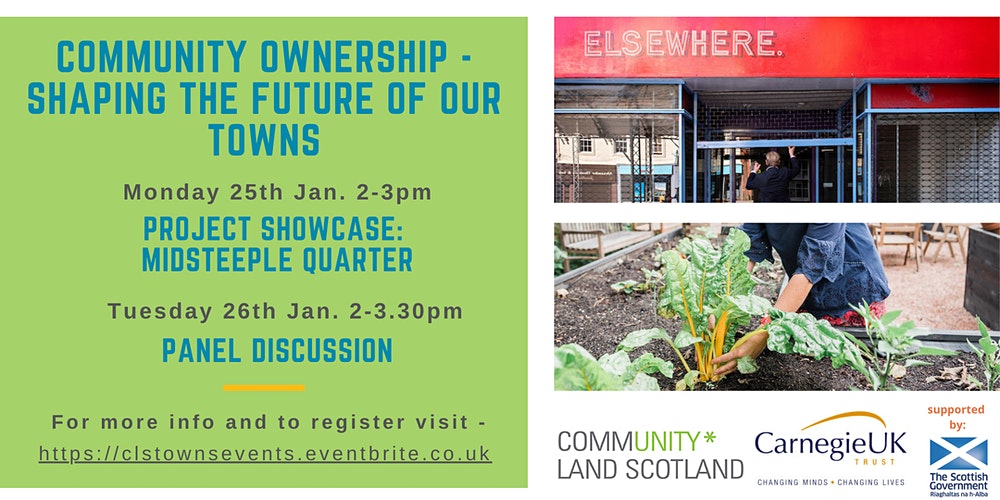Community ownership, recovery and empowerment
Posted on 09 Feb 2021 Categories: Blog, Cross-posts, Local initiatives, New economic models
by Pippa Coutts
I was lucky enough to chair a panel discussion on Community Ownership and Towns this week, with Community Land Scotland, Greener Kirkcaldy, Power to Change, The Stove Network.* We recognised, with many others, the High Street is changing and we need to embrace that change.
Covid has hastened the closure of shopping chains in town centres, and there is much discussion about their future. In this we should remember towns are, and always have been, more than just High Street shops. With their history, their greenspaces, libraries, schools, museums, leisure centres or greens they are places where we can live well, locally, together.
So how can we build on towns’ many assets to create a new future? The panel was clear they’d like to look back in three years and see that communities and community ownership has been a major part of developing towns to provide a mix of different functions and services.
For this to happen communities need to be recognised, by planners, economic regeneration departments and policy makers as valid stakeholders in regeneration. We would like to see communities represented at discussions on property and land development alongside the public and private sectors. We recognise that property markets are well resourced and specialised, so communities may need professional support to join as equals in these conversations. The Community Land Scotland Urban Hub is planning to provide some of this support in the west of Scotland.
“Sustainable Change requires a focus on land, law and power”, Carey Doyle Community Land Scotland.
The panellists reflected on their experiences of supporting communities to take power in their local areas, through acquiring ownership of local assets. Midsteeple Quarter, Dumfries, and Greener Kirkcaldy are examples of the first generation of urban community ownership in Scotland, following land reform legislation and funding in 2016, and offer strong examples of community ownership in towns.
Community ownership is a slow process. The Stove in Dumfries began a conversation with the people of Dumfries a decade ago, asking them what was their vision for the town centre. It was nurtured by The Stove, which used creative engagement to bring people into the conversation: a key learning for other places. The discussion, about the use of the centre, coalesced over five or six years, until the Midsteeple Quarter Community Benefit Society was formed to buy buildings with the ambitions of creating a thriving new heart for Dumfries through enabling a mix of uses including housing and spaces for local enterprises.
At the other end of the country, Nudge Community Builders in Plymouth are bringing their neighbourhood back to life through reclaiming buildings, developing a market, a café, and The Plot, an alternative shopping arcade.
Their experiences point to the challenges in ownership. It takes time and we need to make changes across the UK to make it easier for communities to purchase land and buildings and develop viable businesses. Transferring land and buildings to community ownership is a many step process starting with bringing together people together around a vision, but then requiring knowledge of regeneration and property development. The panellists talked about challenges around knowing who owns buildings, accessing the funding to buy a building and, crucially, to support the community owners to develop it, into a self-sustaining business or accommodation.
Community groups are often organisations run by volunteers, and to take on a project like buying land or buildings , they need resources: from small scale funding (e.g. for a feasibility study), to a sufficiently sized Land Fund, to post-acquisition operational costs.
In 2020, most of us have spent much more time closer to our homes and become more aware of our local environments. We wondered if the COVID-19 pandemic – an ‘inflection point’ when we have had a chance to think differently about our priorities – might lead to more demand for communities to have a greater stake in their high streets. We hope that this desire for communities to take control will be matched by a change in urban regeneration priorities towards understanding and meeting the needs of communities in all their complexity.
*Panel participants were:
Suzy Goodsir, Greener Kirkcaldy
Matt Baker, The Stove Network
Carey Doyle, Community Land Scotland
Nick Plumb, Power to Change
Pippa Coutts is Policy and Development Manager at Carnegie UK Trust.
This was originally posted on the Carnegie UK Trust blog on January 29th 2021.
Want to keep up-to-date with more articles like this? Sign up to our newsletter.
Posted on 09 Feb 2021 Categories: Blog, Cross-posts, Local initiatives, New economic models

